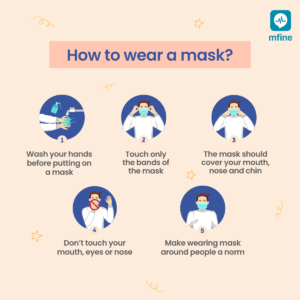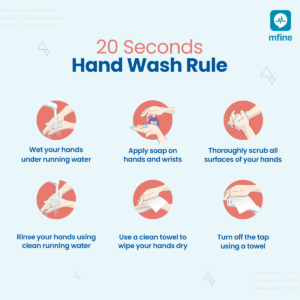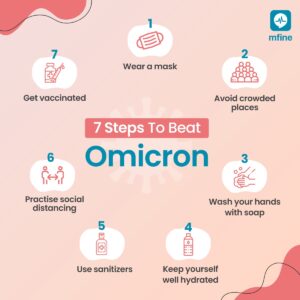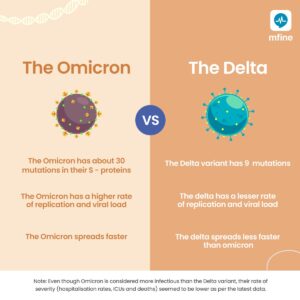How does covid-19 spread?
The covid-19 infection spreads through respiratory droplets or aerosols when you sneeze, cough or talk. While larger respiratory droplets fall immediately to the ground, aerosols are suspended in the air for a while. Therefore, it’s recommended that you always put on a mask, especially if you are in a closed room setting.
Why is it called covid-19?
The virus SARS-CoV-2 causes the disease “Coronavirus Disease”. Hence the name Covid-19. The suffix 19 designates the year it was discovered.
What is an asymptomatic case of COVID-19?
Those who exhibit no symptoms of Covid-19 such as dry cough, fever, diarrhoea, or breathing difficulties are asymptomatic.
What is the incubation period of Covid-19?
The incubation period is the time between being infected with the virus and exhibiting the first symptoms of the disease. The incubation period of Covid-19 is between 2 and 14 days.
How to control the transmission of Covid-19?
Reproductive Ratio, designated as R0 (R nought) if >1, the pandemic will grow and if Ro <1, the pandemic will reverse. And that can only happen if we can prevent the spread of infections through vaccination, maintaining good hygiene, wearing masks and social distancing.
When to seek emergency medical attention?
If you experience severe symptoms of breathlessness, fever, headache and mental confusion you need to seek medical attention immediately.
What is the difference between covid-19 and flu?
Covid-19 and flu can exhibit similar symptoms of cold, breathlessness, fever, cough and headaches. While Covid-19 is caused by the virus SARS-CoV-2, Flu is caused by the human influenza viruses. Additionally, the gene pool of SARS-CoV-2 is from bats (mammals), and the gene pool of flu are from birds (avian).
Is coronavirus (SARS-CoV-2) different from SARS?
Both SARS and Covid-19 exhibit similar symptoms of cold, breathlessness, fever, cough and headaches and are from the same gene pool of bats. i.e., meaning the host of origin for both viruses is the bat. Even though they belong to the same family, they are different viruses.
They also differ in their virulence (severity of infection) and transmission rate. While the fatality rate of the SARS virus is around 9.6% (approx. ten deaths per 100 infections), the fatality rate of the Covid-19 virus is around 3% (approx. three deaths per 100 infections).
Additionally, while the R0 value (rate of transmission) of the SARS virus is less than 1, the R0 value of Covid-19 is around 3, meaning a single person infected with the Covid-19 virus can infect three other persons. In contrast, a SARS infected person can, mathematically speaking, infect no one.
Which virus is responsible for Covid-19?
The SARS-Cov-2 virus causes the disease Covid-19.
When did Covid-19 start in India?
The first case of Covid-19 reported in India was on January 27, 2020.
Can the coronavirus spread through the air?
Yes, respiratory aerosols can linger in the air for a few minutes and spread through the air.
Can people with mild Covid-19 symptoms recover at home?
People with mild Covid-19 symptoms can recover at home. However, if you have symptoms of breathlessness, you should immediately consult a doctor.
Can you catch Covid-19 after two doses of vaccines?
Vaccination does not necessarily protect you from infection, But what it does is that it reduces your likelihood of being severely ill from Covid-19. Severely ill means
- Hospitalization
- ICU
- Death
How long does Covid-19 vaccine side effects last?
Covid-19 vaccination side effects usually last for a few hours to days. But it can be different for various people. Some may even have an overnight fever and flu-like symptoms.
What is Omicron, and what makes it a variant of concern?
The Omicron variant was first discovered in November 2021 across several countries. It is suspected to have 64% higher transmissibility rate, 1000 times more viral load, and 2.5 times more severity (hospitalization rate) than the Delta variant.
Can RT PCR detect Omicron?
RT-PCR can only tell if a person is infected with coronavirus, but it doesn’t exactly tell which variant.
The RT-PCR test looks for three components in the virus: the spike (S), the nucleocapsid (N2), and the envelope (E). Therefore, if N2 and E are discovered but not S, it could mean an Omicron.
How do we keep ourselves safe from Omicron?
- Vaccination
- Maintaining good hygiene
- Social distancing
- Wearing a mask
- Avoiding indoor or crowded outdoor spaces
- Good Ventilation
Do Covid-19 booster shots work?
Covid-19 booster doesn’t protect you from infections. But what it does is that it reduces the severity of Covid-19 symptoms.
Will there be a third wave?
If Ro >1, the pandemic will grow, and if Ro <1, the pandemic will reverse.
Omicron variant Covid-19 vaccine | Will the existing vaccines work against Omicron?
The existing vaccines can only reduce the severity of the disease, but they may not prevent you from being infected by the Covid-19 virus. So far there is no evidence that the variant is evading the vaccine induced immunity completely.
Why do variants of Covid-19 mutations occur?
Genetic mutations in viruses usually happen when they transmit from one host to another. i.e., the higher the infection rate, the higher the mutations. Mutations allow viruses to acquire a new ability to bind to host cells more efficiently and increase their chances of survival and reproduction.
Is it necessary to take two doses of the COVID-19 vaccine?
Yes. It’s necessary to take two doses of the Covid-19 vaccine.
Why do some people get fever after taking the COVID-19 vaccine?
Simply put, vaccines are nothing but weakened Covid-19 viruses or components of the virus injected into your system to generate an antibody response against the foreign substance. Whenever there is an infection or a foreign body in your system, your body generates an immune response against it by raising your body temperature.
What are the organs most affected by COVID‐19?
The Covid-19 virus primarily infects the lungs. But severe cases of infection can cause multi-organ failure.
Long term effects of Covid – 19 | What are some possible complications after recovering from COVID-19?
- Weakness
- Fatigue
- Loss of smell and taste
- Joint pains
- Mood changes
- Change in smell/taste
- Rashes
- Sleep problems
What are some of the COVID-19 Omicron variant symptoms?
Symptoms of Omicron are very similar to the symptoms of delta or ancestral variants. However, Omicron can differ from other variants in their severity and rate of disease transmission.
Does Covid-19 cause death?
The Delta variant has a fatality rate of 3%, i.e., three deaths per 100 infections. The Omicron is thought to have a fatality rate of 5% to 6%, i.e., six deaths per 100 infections.
How is Covid-19 treated?
Covid-19 can only be managed. As of date, there is no cure for the disease.
How is Covid-19 diagnosed?
Covid-19 is diagnosed through an RT-PCR test.
Can cats and dogs get Covid-19?
As of date, there is no evidence to show that Covid-19 infects cats and dogs.
 Gynecologist
Gynecologist General Physician
General Physician Orthopedician
Orthopedician Dietitian
Dietitian Pediatrician
Pediatrician Dermatologist
Dermatologist Psychiatrist
Psychiatrist Andrologist
Andrologist Diabetologist
Diabetologist Urologist
Urologist Gastroenterologist
Gastroenterologist General Surgeon
General Surgeon Endocrinologist
Endocrinologist Dentist
Dentist Cardiologist
Cardiologist Pulmonologist
Pulmonologist Fertility Specialist
Fertility Specialist Oncologist
Oncologist Neurosurgeon
Neurosurgeon Nephrologist
Nephrologist Neurologist
Neurologist Sports Medicine
Sports Medicine Cosmetologist
Cosmetologist













